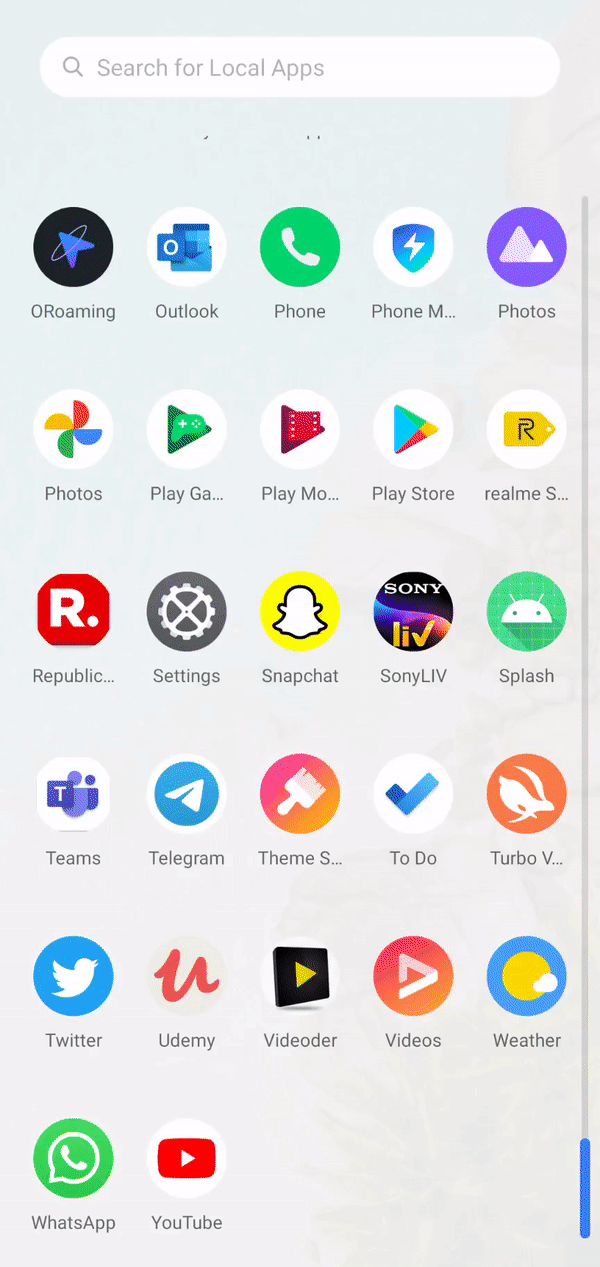How To Create Animated Loading Screen App
Prerequisites: How to Create a Splash Screen in Android using Kotlin?
Android Splash Screen is the starting time screen visible to the user when the application'south launched. Splash Screen is the user'southward first experience with the application that's why information technology is considered to be one of the virtually vital screens in the application. It is used to brandish some information about the visitor logo, visitor name, etc. Nosotros can also add some animations to the Splash screen as well. In this article, we will be making an animated Splash Screen Using Kotlin.A sample GIF is given beneath to get an idea about what we are going to practice in this article.

Steps to Create an Animated Splash Screen
Step 1: Create a New Project
To create a new project in Android Studio please refer to How to Create/Offset a New Project in Android Studio. Note that select Kotlin as the programming language.
Step two: Create an animation file
To create an animation file in android studio please follow the given instructions advisedly. Go to the app > res > right-click > New > Android Resources Directory.

Then proper noun the directory proper noun as anim. And and then click on OK.

Go to the anim > right-click > New > Animation Resource File

And proper name the file name as side_slide and click on OK.

Now add this code to the blithe XML file. Below is the lawmaking for the side_slide.xml file.
XML
<? xml version = "i.0" encoding = "utf-8" ?>
< ready
< interpret
android:duration = "1500"
android:fromXDelta = "-50%"
android:fromYDelta = "0%" />
< alpha
android:elapsing = "1500"
android:fromAlpha = "0.1"
android:toAlpha = "1.0" />
</ prepare >
Footstep three: Create another activity
Go to app > coffee > first bundle proper name > right-click > New > Activity > Empty Activity and create another action and named it every bit SplashScreen. Edit the activity_splash_screen.xml file and add together prototype, text in the splash screen as per the requirement. Here we are adding an paradigm to the splash screen. Below is the lawmaking for the activity_splash_screen.xml file.
XML
<? xml version = "1.0" encoding = "utf-8" ?>
< androidx.constraintlayout.widget.ConstraintLayout
android:layout_width = "match_parent"
android:layout_height = "match_parent"
android:groundwork = "#fff"
tools:context = ".SplashScreen" >
< ImageView
android:id = "@+id/SplashScreenImage"
android:layout_width = "300dp"
android:layout_height = "200dp"
android:src = "@drawable/geeksforgeeks"
app:layout_constraintBottom_toBottomOf = "parent"
app:layout_constraintLeft_toLeftOf = "parent"
app:layout_constraintRight_toRightOf = "parent"
app:layout_constraintTop_toTopOf = "parent" />
</ androidx.constraintlayout.widget.ConstraintLayout >
Get to the SplashScreen.kt file, and refer to the following code. Beneath is the code for the SplashScreen.kt file. Comments are added inside the code to understand the lawmaking in more detail.
Kotlin
import android.content.Intent
import android.bone.Bundle
import android.os.Handler
import android.view.WindowManager
import android.view.animation.AnimationUtils
import android.widget.ImageView
import androidx.appcompat.app.AppCompatActivity
@Suppress ( "DEPRECATION" )
class SplashScreen : AppCompatActivity() {
override fun onCreate(savedInstanceState: Packet?) {
super .onCreate(savedInstanceState)
setContentView(R.layout.activity_splash_screen)
window.setFlags(
WindowManager.LayoutParams.FLAG_FULLSCREEN,
WindowManager.LayoutParams.FLAG_FULLSCREEN
)
val backgroundImage: ImageView = findViewById(R.id.SplashScreenImage)
val slideAnimation = AnimationUtils.loadAnimation( this , R.anim.side_slide)
backgroundImage.startAnimation(slideAnimation)
Handler().postDelayed({
val intent = Intent( this , MainActivity:: class .java)
startActivity(intent)
terminate()
}, 3000 )
}
}
Footstep 4: Working with the AndroidManifest.xml file
Go to the AndroidManifest.xml file and add the following lawmaking in the Splash Screen Activeness. This is used to hide the status bar or activeness bar.
android:theme="@fashion/Theme.AppCompat.Light.NoActionBar"
As well, add <intent-filter> inside the Splash Screen Activity to brand this activity equally the starting activity. And so whenever the app will execute the user can see the splash screen at the beginning. Below is the consummate lawmaking for the AndroidManifest.xml file.
XML
<? xml version = "1.0" encoding = "utf-8" ?>
bundle = "com.instance.animatedsplashscreen" >
< application
android:allowBackup = "true"
android:icon = "@mipmap/ic_launcher"
android:characterization = "@string/app_name"
android:roundIcon = "@mipmap/ic_launcher_round"
android:supportsRtl = "true"
android:theme = "@manner/AppTheme" >
< activity android:name = ".MainActivity" ></ activity >
< activity
android:proper name = ".SplashScreen"
android:theme = "@mode/Theme.AppCompat.Light.NoActionBar" >
< intent-filter >
< action android:proper noun = "android.intent.action.MAIN" />
< category android:name = "android.intent.category.LAUNCHER" />
</ intent-filter >
</ activity >
</ awarding >
</ manifest >
Footstep five: Working with the activity_main.xml file
Go to the activity_main.xml file and add a text which volition prove "Welcome to GeeksforGeeks" when the user will enter into the MainActivity. Below is the code for the activity_main.xml file.
XML
<? xml version = "one.0" encoding = "utf-8" ?>
< androidx.constraintlayout.widget.ConstraintLayout
android:layout_width = "match_parent"
android:layout_height = "match_parent"
android:background = "#000"
tools:context = ".MainActivity" >
< TextView
android:layout_width = "wrap_content"
android:layout_height = "wrap_content"
android:text = "Welcome To GeeksforGeeks"
android:textColor = "@colour/colorAccent"
android:textSize = "20dp"
app:layout_constraintBottom_toBottomOf = "parent"
app:layout_constraintLeft_toLeftOf = "parent"
app:layout_constraintRight_toRightOf = "parent"
app:layout_constraintTop_toTopOf = "parent" />
</ androidx.constraintlayout.widget.ConstraintLayout >
Step 6: Working with the MainActivity.kt file
Do cypher in the MainActivity.kt file every bit we already created a new activeness for the Splash Screen. Below is the code for the MainActivity.kt file
Kotlin
import androidx.appcompat.app.AppCompatActivity
import android.os.Bundle
import android.widget.Toast
class MainActivity : AppCompatActivity() {
override fun onCreate(savedInstanceState: Parcel?) {
super .onCreate(savedInstanceState)
setContentView(R.layout.activity_main)
}
}
Output
Find this project on Github: https://github.com/Gauravverma245/AnimatedSplashScreen
Source: https://www.geeksforgeeks.org/how-to-create-an-animated-splash-screen-in-android/
Posted by: bruntonthersellse1961.blogspot.com

0 Response to "How To Create Animated Loading Screen App"
Post a Comment